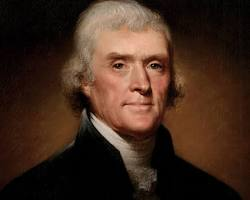Thomas Jefferson: Founding Father, Scholar, Architect, and President
Thomas Jefferson (1743-1826), the third President of the United States, was a multifaceted individual who left an indelible mark on American history. His contributions spanned the realms of politics, philosophy, architecture, and science, solidifying his place as one of America's most significant Founding Fathers.
Early Life and Education
Born into a wealthy Virginia planter family, Jefferson received a classical education at the College of William & Mary. He became an avid reader, devouring philosophy, history, and literature. This intellectual curiosity fueled his lifelong pursuit of knowledge across various disciplines.
Revolution and the Declaration of Independence
Jefferson's political philosophy, emphasizing individual liberty and republican ideals, placed him at the forefront of the growing movement for independence from Great Britain. He served in the Virginia House of Burgesses and the Continental Congress. His most enduring contribution during this period was the drafting of the Declaration of Independence in 1776. The document's eloquent articulation of revolutionary principles – life, liberty, and the pursuit of happiness – became a cornerstone of American democracy.
Political Career
Following the Revolution, Jefferson served as Governor of Virginia and later as the nation's first Secretary of State under President George Washington. During this time, he clashed with Alexander Hamilton over the direction of the young nation, particularly regarding the role of a strong federal government versus states' rights. These differences led to the formation of the Democratic-Republican Party, with Jefferson as a leading figure.
The Presidency and the Louisiana Purchase
Jefferson's victory in the 1800 election marked a peaceful transfer of power between political parties, a crucial precedent for American democracy. His presidency (1801-1809) was marked by a focus on republican ideals and a reduction in the federal government's size and power. One of his most significant achievements was the Louisiana Purchase in 1803, which nearly doubled the size of the United States.
Beyond Politics: A Man of Many Talents
Jefferson's interests and talents extended far beyond the political sphere. He was a skilled architect, designing his iconic Monticello plantation home. He was a passionate inventor, creating ingenious contraptions like the hemp plow and the swivel chair. His love of science and exploration led him to sponsor the Lewis and Clark Expedition, which charted the vast western territories. He even corresponded with prominent European intellectuals, reflecting his broad and curious mind.
A Complicated Legacy
While Jefferson's contributions to American democracy are undeniable, his legacy is complex. He was a slaveholder, and his views on race remain a source of controversy. However, he also recognized the hypocrisy of slavery within a nation founded on the ideals of liberty. He advocated for gradual emancipation, though never fully addressed the issue during his lifetime.


Comments
Post a Comment